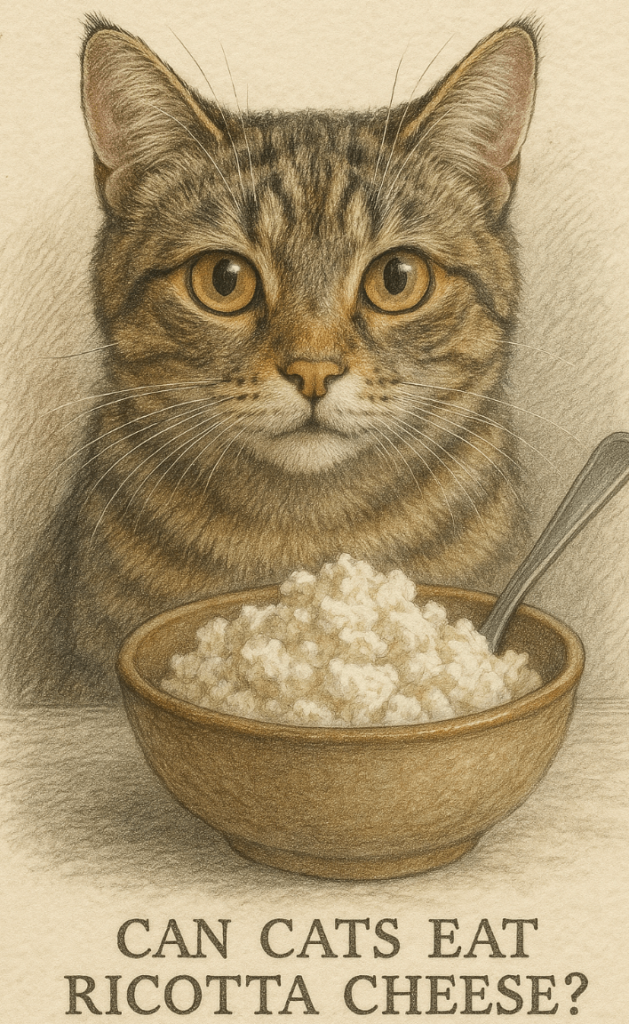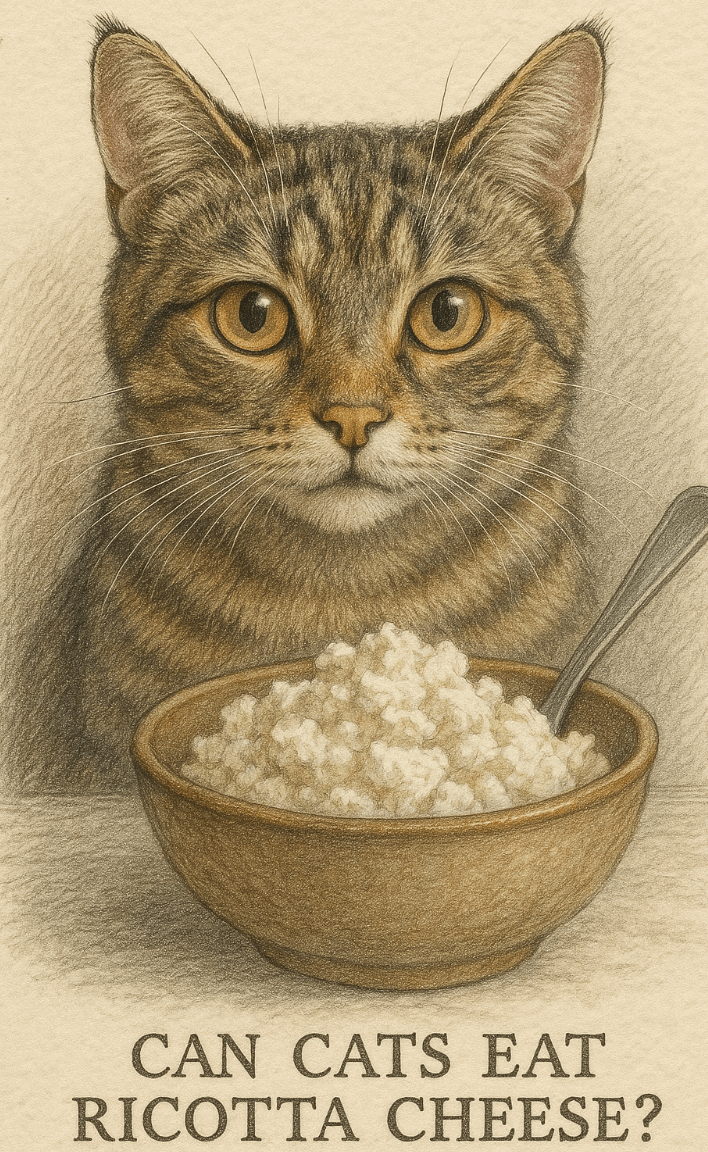Can Cats Eat Ricotta Cheese?
When it comes to treating our feline friends, many cat owners wonder whether ricotta cheese is a safe and healthy option. While cats are obligate carnivores, meaning their primary diet should consist of animal-based proteins, some human foods can be offered in moderation as occasional treats. Ricotta cheese, known for its creamy texture and mild flavor, might seem like a tempting snack for your cat. But is it truly safe? In this blog post, we’ll explore the potential benefits and risks of feeding ricotta cheese to your cat, along with expert tips to ensure their health and happiness.
Potential Benefits of Feeding Ricotta Cheese to Cats
In moderation, ricotta cheese can offer some nutritional benefits for cats, making it an appealing treat option for pet owners. However, it’s important to understand what these benefits are and how they fit into your cat’s overall diet.
High-Quality Protein:
Ricotta cheese contains protein, which is essential for muscle maintenance and overall energy in cats.Calcium for Bone Health:
This dairy product is rich in calcium, supporting strong bones and teeth in your feline companion.Low Lactose Content:
Compared to other cheeses, ricotta has a lower lactose level, making it easier to digest for some cats.Hydration Support:
Its creamy texture can help encourage hydration, especially if your cat enjoys licking it up.Treat Variety:
Offering ricotta as an occasional treat adds variety to your cat’s diet, keeping mealtime exciting.
While these benefits exist, ricotta cheese should only be given sparingly and under careful supervision.
Risks of Feeding Ricotta Cheese to Cats
Despite its potential benefits, ricotta cheese also comes with certain risks that every cat owner should consider before sharing it with their pet.
Lactose Intolerance:
Many adult cats are lactose intolerant, and even low-lactose ricotta can cause digestive upset like diarrhea or vomiting.High Fat Content:
Ricotta cheese contains fat, which can contribute to obesity or pancreatitis if fed in excess.Nutritional Imbalance:
Cats require a diet high in animal-based proteins, and too much ricotta can disrupt their nutritional balance.Allergic Reactions:
Some cats may develop allergies or sensitivities to dairy products, leading to skin issues or gastrointestinal distress.Additives and Salt:
Store-bought ricotta may contain added salt or preservatives, which can harm your cat’s health over time.
Understanding these risks ensures you make informed decisions about including ricotta in your cat’s diet.
Check this guide 👉Can Cats Eat Turkey Liver? Best 7 Expert Tips!
Check this guide 👉Can Cats Eat Trout? Best 7 Expert Tips!
Check this guide 👉Can Cats Eat Melatonin? Best 7 Expert Tips!

Safe Alternatives to Ricotta Cheese | Foods to Avoid Giving Cats |
|---|---|
Plain cooked chicken (unseasoned) | Chocolate |
Pumpkin puree (plain, unsweetened) | Onions and garlic |
Small amounts of plain yogurt | Grapes and raisins |
Boiled eggs (in moderation) | Alcohol |
Fish oil supplements (vet-approved) | Raw dough or yeast-based products |
How to Safely Introduce Ricotta Cheese to Your Cat
If you decide to give your cat ricotta cheese, it’s crucial to introduce it carefully and monitor their reaction. Follow these guidelines to minimize risks and ensure safety.
Start with a Tiny Amount:
Offer just a small teaspoon of ricotta to see how your cat reacts before giving more.Choose Plain, Unflavored Ricotta:
Avoid flavored or sweetened varieties, as they may contain ingredients harmful to cats.Monitor Digestive Health:
Watch for signs of upset stomach, such as diarrhea, vomiting, or excessive gas, after feeding.Limit Frequency:
Use ricotta as an occasional treat rather than a regular part of your cat’s diet.Consult Your Veterinarian:
Before introducing any new food, seek advice from your vet to confirm it’s suitable for your cat.
By following these steps, you can safely incorporate ricotta into your cat’s treat rotation.
Signs Your Cat May Not Tolerate Ricotta Cheese
Even if ricotta seems harmless, some cats simply cannot tolerate it due to their unique physiology. Recognizing warning signs early can prevent further complications.
Diarrhea or Loose Stools:
These symptoms indicate digestive distress, often caused by lactose intolerance or dietary changes.Vomiting:
If your cat vomits shortly after eating ricotta, it may not agree with their system.Loss of Appetite:
A sudden refusal to eat could signal discomfort or illness triggered by the new food.Excessive Gas or Bloating:
These are common reactions to lactose or fat content in dairy products.Skin Irritation or Itching:
Allergic reactions to dairy can manifest as rashes, itching, or redness around the face or paws.
Noticing these signs allows you to act quickly and adjust your cat’s diet accordingly.
Common Mistakes to Avoid When Feeding Ricotta Cheese
Feeding ricotta cheese to your cat requires attention to detail to avoid unintended consequences. Here are some common mistakes to steer clear of.
Offering Too Much at Once:
Overfeeding ricotta can overwhelm your cat’s digestive system and lead to discomfort.Choosing Flavored Varieties:
Flavored ricotta often contains sugar, salt, or additives that are harmful to cats.Ignoring Signs of Intolerance:
Failing to recognize digestive or allergic reactions can result in prolonged discomfort for your cat.Making It a Regular Treat:
Frequent ricotta consumption can unbalance your cat’s diet and contribute to weight gain.Skipping Veterinary Advice:
Always consult your vet before introducing new foods, especially for cats with pre-existing conditions.
Avoiding these mistakes ensures a safer experience for your cat.
Alternatives That Provide Similar Benefits to Ricotta Cheese
If ricotta doesn’t suit your cat’s needs, there are plenty of alternatives that offer similar nutritional benefits without the associated risks.
Plain Cooked Chicken:
High in protein and easy to digest, cooked chicken is a staple treat for cats.Pumpkin Puree:
Rich in fiber, pumpkin aids digestion and can help regulate bowel movements.Small Portions of Plain Yogurt:
Low-lactose yogurt provides probiotics that support gut health.Boiled Eggs:
Eggs are packed with protein and vitamins, making them a nutritious occasional treat.Fish Oil Supplements:
Vet-recommended fish oil supports coat health and joint function without the risk of dairy.
These alternatives allow you to cater to your cat’s dietary needs while avoiding potential pitfalls.
Understanding Your Cat’s Unique Dietary Needs
Every cat is different, and understanding their specific dietary requirements is key to keeping them healthy. Here are some factors to consider when deciding whether to include ricotta or other treats in their diet.
Age and Life Stage:
Kittens, adults, and senior cats have varying nutritional needs, so tailor their diet accordingly.Health Conditions:
Cats with diabetes, obesity, or kidney issues require strict dietary management and should avoid high-fat or high-sodium foods.Activity Level:
Active cats may burn more calories and tolerate occasional treats better than sedentary ones.Food Preferences:
Some cats simply don’t enjoy dairy, while others may show interest—respect their preferences.Allergies and Sensitivities:
Monitor your cat for signs of food allergies or sensitivities, adjusting their diet as needed.
By considering these factors, you can make informed choices that align with your cat’s unique needs and preferences.
Frequently Asked Questions About Cats and Ricotta Cheese
Is ricotta cheese toxic to cats?
No, ricotta cheese isn’t toxic, but it can still cause digestive issues if fed excessively or without caution.
Can kittens eat ricotta cheese?
Kittens have sensitive digestive systems, so it’s best to avoid giving them ricotta altogether.
How much ricotta can I give my cat?
Limit portions to no more than one teaspoon per serving, and only occasionally.
What type of ricotta is safest for cats?
Plain, unsweetened, and low-sodium ricotta is the safest option for cats.
What should I do if my cat has an adverse reaction?
Stop feeding ricotta immediately and consult your veterinarian if symptoms persist.
Prioritizing Your Cat’s Health When Offering Treats
While ricotta cheese can be a tasty and nutritious treat for some cats, it’s essential to approach it with caution. Understanding your cat’s individual needs, tolerances, and dietary requirements ensures their well-being remains the top priority. Always prioritize high-quality, species-appropriate food and use treats like ricotta sparingly. By doing so, you’ll provide your feline friend with a balanced and enjoyable diet that keeps them happy and healthy for years to come.
Do Cats Have Taste Buds? Best 7 Expert Tips! – Discover how cats experience flavors and why their taste is so unique.
Do Dogs Have Taste Buds? Best 7 Expert Tips! – Discover how dogs experience taste, their preferences, and what it means for their diet and health.
Can Cats Taste Sweet? Best 7 Expert Tips! – Discover why cats can’t taste sweetness, how it affects their diet, and tips to keep them healthy and happy.
Can Dogs Taste Sweet? Best 7 Expert Tips! – Discover how dogs perceive sweetness, which foods are safe, and tips to manage their sweet cravings responsibly.





